37 diagram of amino acids
Amino Acids Chart. Create Biology Diagram examples like this template called Amino Acids Chart that you can easily edit and customize in minutes. 14/20 EXAMPLES. EDIT THIS EXAMPLE. CLICK TO EDIT THIS EXAMPLE. Text in this Example:
Amino acids that contain only the α amino and α carboxyl groups, which act as Brønsted-Lowry acid-base conjugate pairs somewhere within the normal aqueous pH range (meaning that the pK a of the acidic form of the pair lies between 0 and 14), effectively form a diprotic system, with three possible protonation or charge states.
Hydrophobic Amino Acids: What are hydrophobic and polar groups? Amino acids are grouped according to what their side chains are like. The nine amino acids that have hydrophobic side chains are glycine (Gly), alanine (Ala), valine (Val), leucine (Leu), isoleucine (Ile), proline (Pro), phenylalanine (Phe), methionine (Met), and tryptophan (Trp). Shown at the right is the structure of valine.

Diagram of amino acids
Amino Acids - Biology Diagram. Create Biology Diagram examples like this template called Amino Acids - Biology Diagram that you can easily edit and customize in minutes. 15/20 EXAMPLES.
Many of the amino acids that are common to C and V domains of immuno-globulin chains lie in the core of the immunoglobulin fold and are critical to its stability. For that reason, other proteins having sequences similar to those of immunoglobulins are believed to form domains of similar structure, and in many cases this has been demonstrated by ...
a-Amino Acids Structure: Things to Note 8 • There are some common features of these amino acids that should be noted. • All, but one of these a-amino acids, contain a primary amino group and a carboxylic acid group attached to the same carbon and conform to the general structure above.
Diagram of amino acids.
The structure of most amino acids Amino acids are the building blocks of proteins; they contain a carboxylic acid group and an amino group on the alpha (α) carbon, the carbon adjacent to the C=O; because they have both a weak acid and weak base present, they actually exist as a salt; each amino acid contains a different side group (R)
Amino Acids are the organic compounds which combine to form proteins, hence they are referred to as the building components of proteins. These biomolecules are involved in several biological and chemical functions in a human body and are the necessary ingredients for the growth and development of human beings.
There are 20 different amino acids in polypeptides synthesised on ... Click on the diagram to swap between chemical structure and molecular representations.
Amino acids differ from each other with respect to their side chains, which are referred to as R groups. The R group for each of the amino acids will differ in structure, electrical charge, and polarity. Refer to the charts and structures below to explore amino acid properties, types, applications, and availability.
Download scientific diagram | 1: Schematic diagram of an amino acid from publication: Consensus fold recognition by predicted model quality ...
α-amino acids, with the exception of proline, which is an α-imino acid. This means that they have a carboxyl group, an amino nitrogen group, and a side chain attached to a central α-carbon (Figure 10-1). Functional differences among the amino acids lie in the structure of their side chains.
by JB Lamy · 2018 · Cited by 5 — Rainbow boxes diagram displaying 8 properties of the 20 amino acids. Abstract—Euler diagrams are commonly used for visualizing small datasets, ...
General Structure of Common Amino Acids •General structure of amino acids, group and a variable side chain •Side chain determines: protein folding, binding to specific ligand and interaction with its environment •Amino acids consists of a constant COOH (R is side chain) •At neutral pH, H 2 N- protonated to H 3 N+-, and -COOH ...
28 Sept 2021 — As the diagram below shows, the absolute configuration of the amino acids can be shown with the H pointed to the rear, the COOH groups ...
11 nonessential amino acids. - can be made by the body. -alanin, arginine, asparagine, aspartic acid, cysteine, glutamic, glutamin, glycine, proline, serine, tryosine. classification of structure. 1)primary- sequence of amino acids. 2)secondary- bening of AA's close to each other; alpha-helix. 3)tertiary- bending & folding od AA's that are far ...
Amino acids are organic molecules that, when linked together with other amino acids, form a protein.Amino acids are essential to life because the proteins they form are involved in virtually all cell functions. Some proteins function as enzymes, some as antibodies, while others provide structural support.Although there are hundreds of amino acids found in nature, proteins are constructed from ...
In the diagram 3 amino acids are shown linked together through the peptide linkage. The atoms in each coloured box form the peptide link and lie in the same plane. The planes gradually twist as the polypeptide chain grows.
Here is the structure of twenty amino acids with their chemical formula. Sources of Amino Acids Amino acids play an important role in performing several biological and chemical functions in different parts of our body, including building and repairing of the tissues, in the formation and function of enzymes , food digestion, for the ...
Amino acid, any of a group of organic molecules that consist of a basic amino group, an acidic carboxyl group, and a unique organic side chain. The term amino acid is short for α-amino [alpha-amino] carboxylic acid. Examples of amino acids include glycine and threonine.
Amino Acid Structure Chart and Reference Table. Amino acids are the backbone of peptides and proteins. All amino acids contain both amino and carboxylic acids, and in certain cases, side chains. The properties of amino acids are determined by the functional substituents linked on the side chains, which are most commonly referred to as R groups.
A fourth weak force also has a central role in determining the shape of a protein.As described in Chapter 2, hydrophobic molecules, including the nonpolar side chains of particular amino acids, tend to be forced together in an aqueous environment in order to minimize their disruptive effect on the hydrogen-bonded network of water molecules (see p. 58 and Panel 2-2, pp. 112-113).
Within a protein, multiple amino acids are linked together by peptide ... A three-part diagram shows the generic chemical structure of an amino acid (top.
During protein synthesis, the carboxyl group of the amino acid at the end of the growing polypeptide chain chain reacts with the amino group of an incoming amino acid, releasing a molecule of water. The resulting bond between amino acids is a peptide bond. Peptide bond formation between two amino acids. In a peptide bond, the carbonyl C of one ...
a guide to the twenty common amino acids amino acids are the building blocks of proteins in living organisms. there are over 500 amino acids found in nature - however, the human genetic code only directly encodes 20. 'essential' amino acids must be obtained from the diet, whilst non-essential amino acids can be synthesised in the body. by nc nd
Structure of Amino Acids. Now, let's take a look at the structure of amino acids and proteins beginning with amino acids. An amino acid contains an amino group, a carboxylate group, an R group which distinguishes one amino acid from another, and a carbon called an alpha carbon on which a hydrogen and the R group is connected.
interactions between the R groups of the amino acids that make up the protein. • Important to tertiary structure are . hydrophobic interactions, in which amino acids with nonpolar, hydrophobic R groups cluster together on the inside of the protein, leaving hydrophilic amino acids on the outside to interact with surrounding water molecules ...
Structure of Amino Acids (Source: Wikibooks) There are actually thousands of amino acids occurring in nature. But only about 20 amino acids form a part of the proteins in the human body. These twenty acids will be our focus here. Although all these have varied structures, the basic structure of amino acid remains uniform.
Amino Acid Structure - Amino acid, any of a group of organic molecules that consist of a basic amino group, an acidic carboxyl group, and a unique organic side chain. Amino acids are organic compounds that combine to form proteins. The general formula of an amino acid is R-CH(NH2)-COOH.
And I'll write "amino acids" in, I'll write it in a brighter color, since that's going to be the focus of this video. So tRNA and amino acids, you're able to construct proteins. You are able to construct proteins, which are made up of chains of amino acids, and it's the proteins that do a lot of the work of the organism.
What is the structure of amino acids? Amino acids are the monomers that make up proteins. Each amino acid has the same fundamental structure , which consists of a central carbon atom, also known as the alpha (α) carbon, bonded to an amino group (NH2), a carboxyl group (COOH), and to a hydrogen atom.
Amino acids are organic compounds that contain amino (−NH + 3) and carboxylate −CO − 2 functional groups, along with a side chain (R group) specific to each amino acid. The elements present in every amino acid are carbon (C), hydrogen (H), oxygen (O), and nitrogen (N); in addition sulfur (S) is present in the side chains of cysteine and methionine, and selenium (Se) in the less common ...
Amino acids that fall under the classification of hydrophobic are alanine, valine, isoleucine, leucine, methionine, phenylalanine, tryptophan and tyrosine. As their classification suggests, the side chains tend to be repelled from water, so this impacts the positioning of these amino acids in the protein tertiary structure. Properties of polar ...



:max_bytes(150000):strip_icc()/amino_acid_structure-58c9599d3df78c353c9b5d2e.jpg)
![PDF] A New Diagram for Amino Acids: User Study Comparing ...](https://d3i71xaburhd42.cloudfront.net/27f3e532e8e01519cf503476e975319ba5d2804d/2-Figure2-1.png)





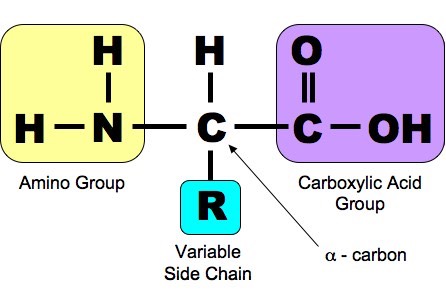
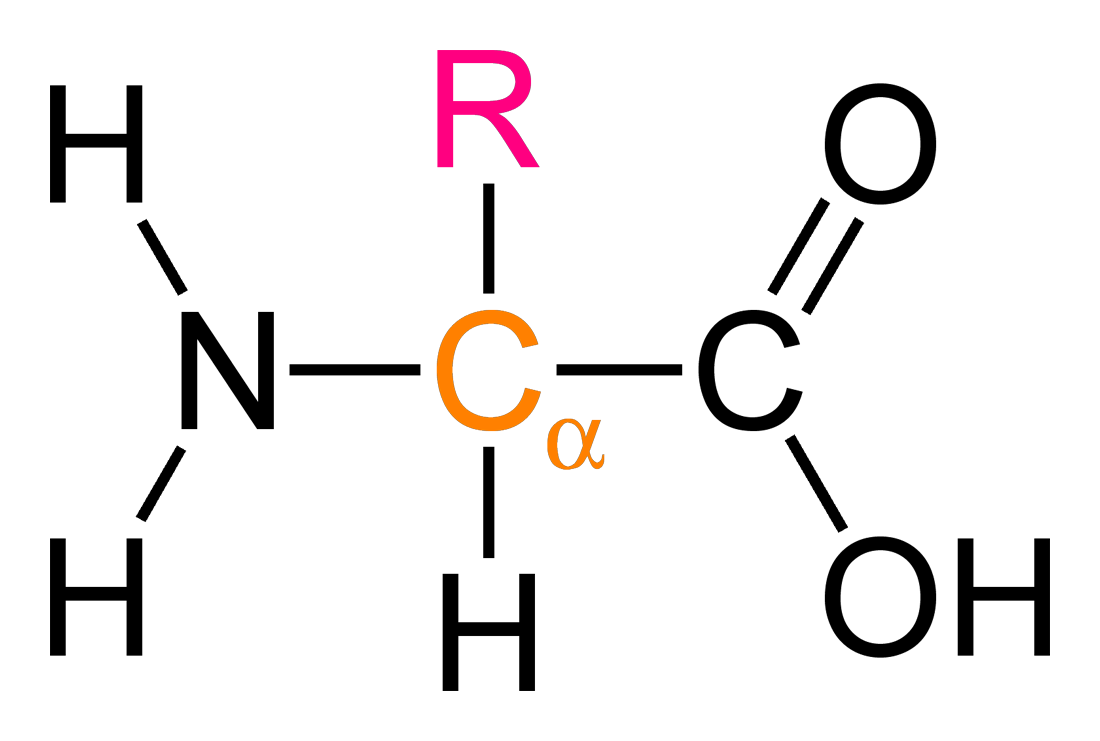
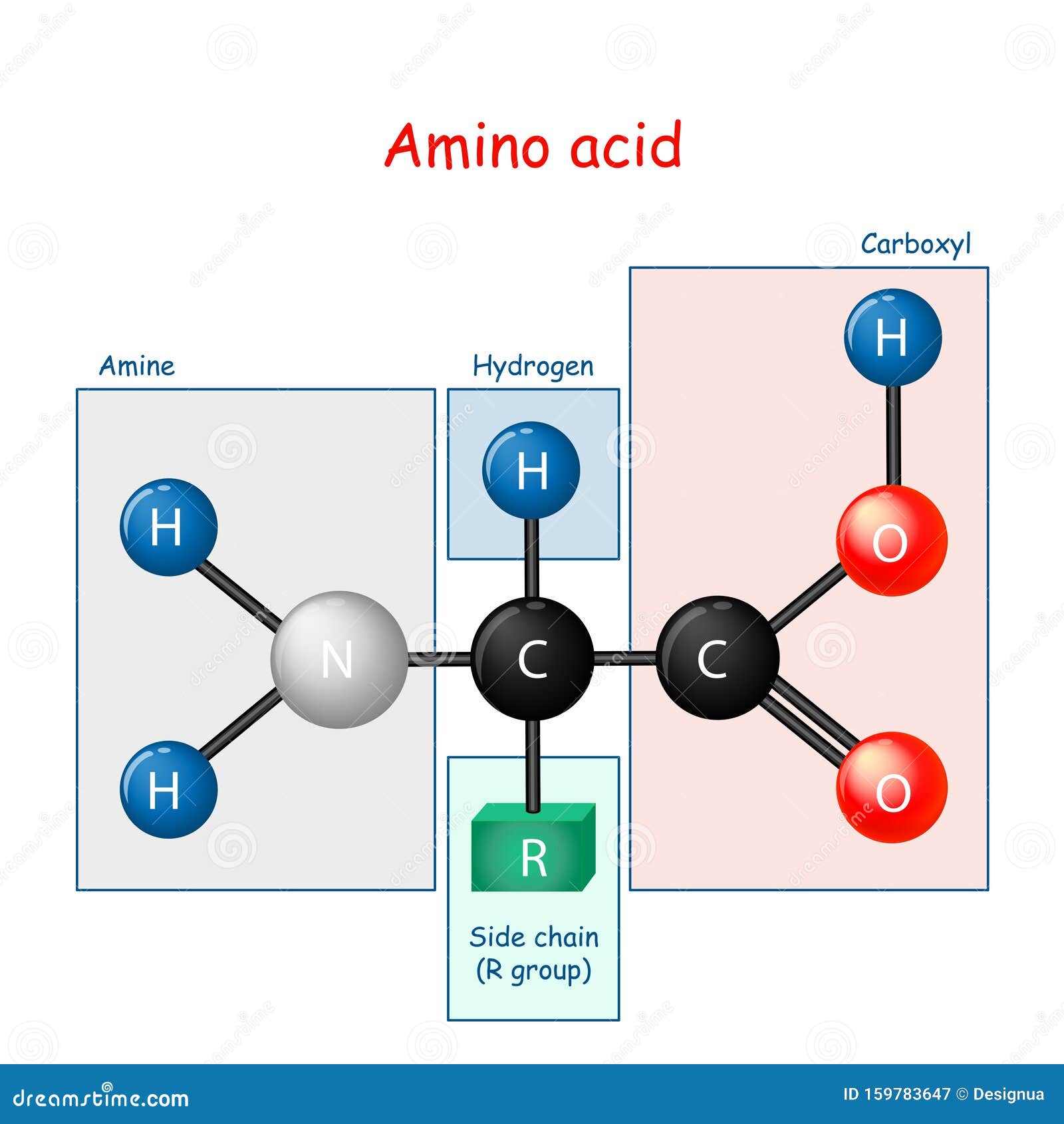
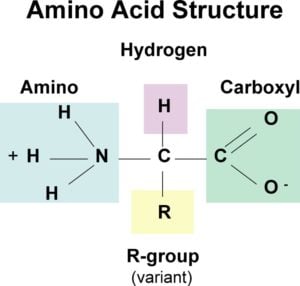


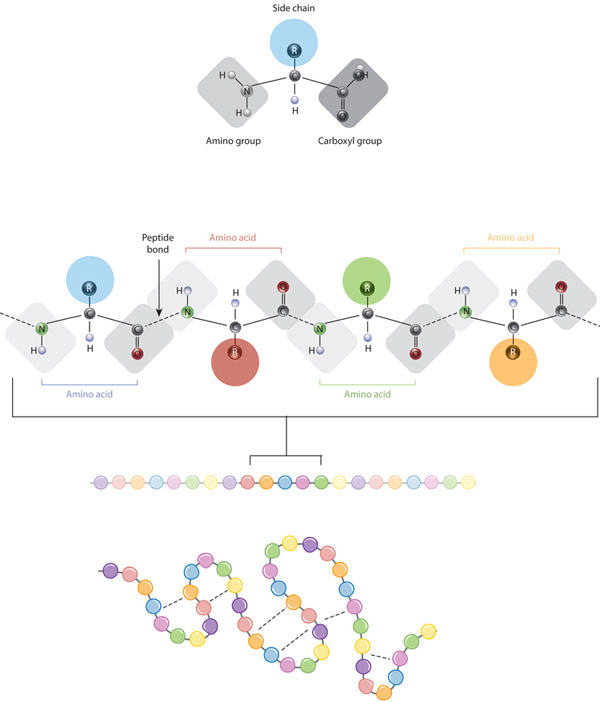



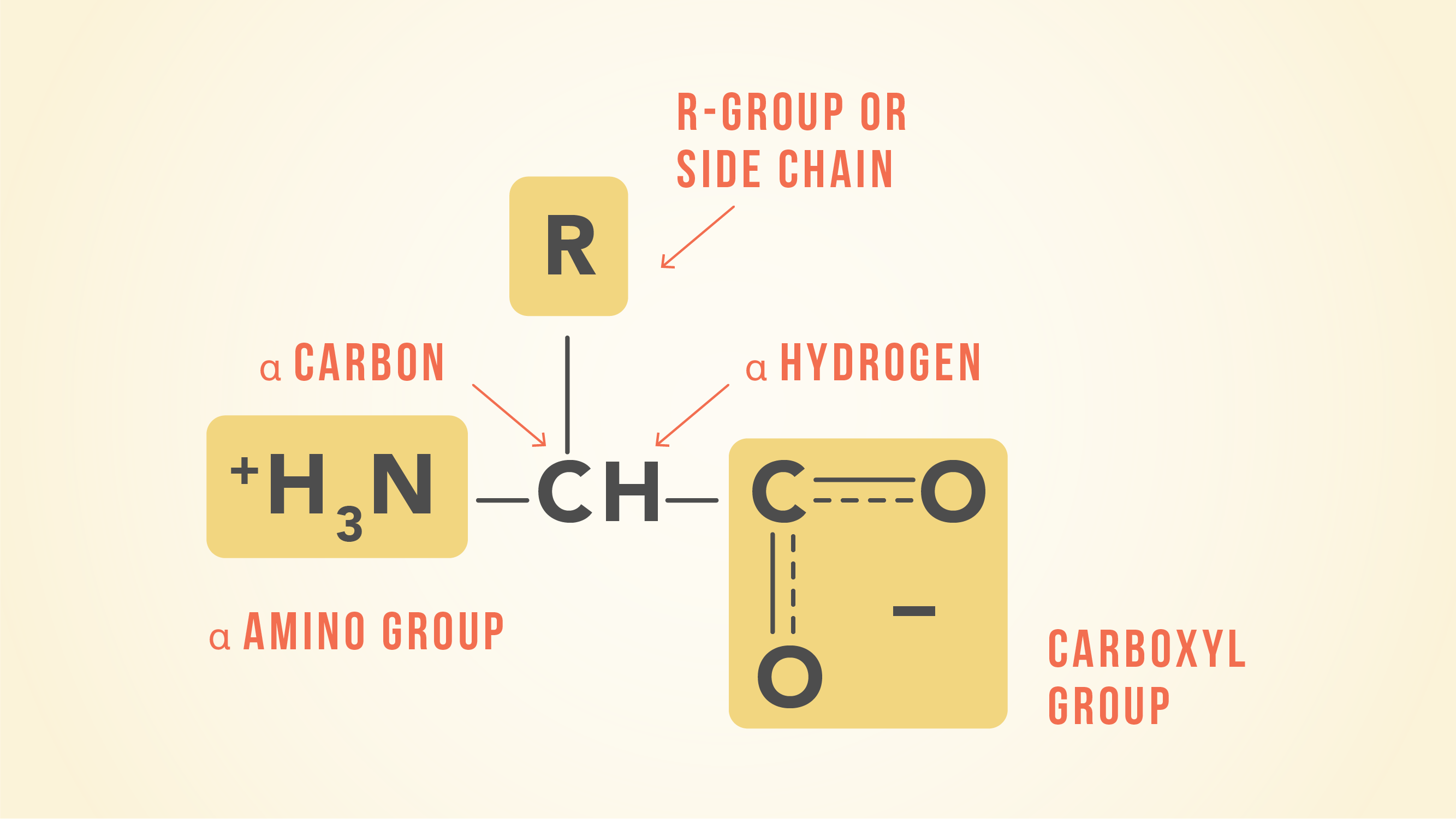


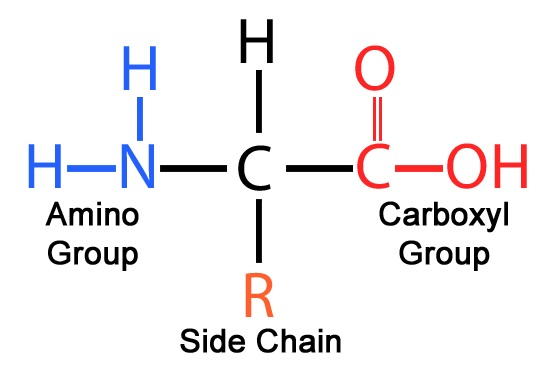


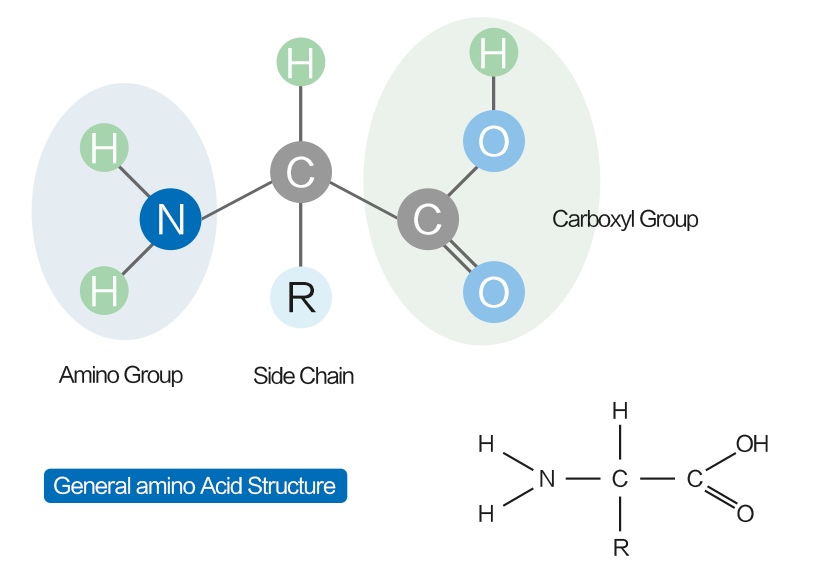




0 Response to "37 diagram of amino acids"
Post a Comment